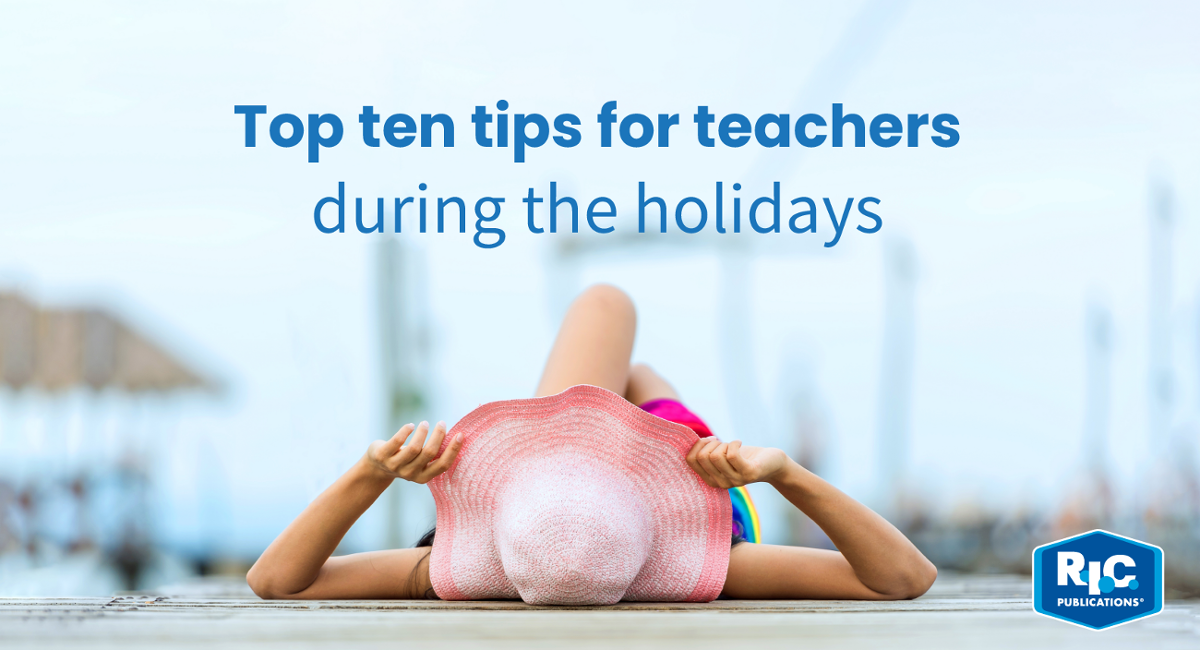- Tuesday 19 November 2019
- 0 Comments
Top ten tips for teachers during holidays
So it’s the end-of-year school holiday time and you’re ready to hit the vino to wind down. Teacher burnout is a real issue and focusing on your mental health should be a priority. A 2011 Australian study showed that 41% of teachers reported high levels of occupational stress[i]. No wonder 5.7% of teachers are abandoning the profession each year[ii], and the statistics are a lot worse for new teachers, with 50% leaving within the first five years[iii].
So in an effort to avoid being part of these statistics, it is essential that you set aside some intentional ‘me’ time these holidays. Don’t fear, we are here to offer you some fun, wine-free options that can help you regain your sanity and recharge your batteries. You got this!
1. Take some yoga classes. The purpose of yoga is to bring together the mind and body, so it’s the perfect way to get back some Zen. It has been known to decrease stress and anxiety as well as improve flexibility and balance. That a good two-for-one in our books.
2. Go on an adventure holiday. Think of travel as therapy; a journey to learn about yourself by going away from your usual environment. Leave your worries behind and become carefree and curious like a child. Not only will you gain a better understanding of the world, you will also come back home and feel appreciative of what you have.
3. Take a healthy cooking class. You need all the help you can get to stay healthy and ward off the kid- germs, so take some lessons in healthy meal prep. It will help you become aware of what you are eating to fuel your body and give you ideas for your lunch box. A healthy diet is the best weapon we have to prevent illness and disease.
4. Binge-watch a show on the couch in your pyjamas. And take long naps in between. There is nothing wrong with giving in to the guilty pleasure of doing nothing. Just switch off your mind and switch on the telly
... just maybe not for the entire holiday break.
5. Go for a walk every day in the sunshine. It’s a great way to top up your vitamin D and get some fresh air. Around 1/4 of Australians have a Vitamin D deficiency[iv], which affects bone and muscle health. Increasing the sunshine in your life will also help increase serotonin levels, which can help keep you in a good mood.
6. Do something you haven’t done before. Aren’t the self-help gurus always saying ‘Do one thing every day that scares you’? Well, there is some scientific evidence that says that going out of your comfort zone helps you be more productive, prepares you for change, and helps you harness your creativity. So try something that pushes your personal boundaries, even if it means eating a quinoa kale salad for the first time.
7. Do a course. It doesn’t have to be education related, just something that interests you and will help you gain another skill. After all, if you don’t explore a passion for learning how can you expect your students to?!
8. Volunteer. Although this is meant as an unselfish act, in helping others we end up helping ourselves. Not only will you be helping someone in need you will also get the positive feelings associated with doing a good deed, and ultimately this can help lower depression. There is even neural evidence to suggest that generosity and happiness are linked, so get giving!
9. Read a book. Any book. It doesn’t have to be a literary prize-winner, just something that you can completely immerse yourself in and take your mind to another place. Isn’t that what we hope our students discover about the joy of reading? They just need to find a book that gels with them, and so do you.
10. Design something. Harness your creative thinking and problem-solving skills, and explore some design challenges to get your mind thinking outside of the box. Just by changing your thinking you may end up solving other problems that are on your mind.
Remember, you can’t give from an empty bucket, so what will you do to fill yours up this holiday?
------------------------------------------------------
[i] Milburn, 2011, cited at http://www.research.uwa.edu.au/__data/assets/pdf_file/0010/2633590/teacher-wellbeing-and-student.pdf
[ii] Australian Government, cited by Stroud at https://www.abc.net.au/news/2017-02-04/why-do-teachers-leave/8234054
[iii] Marshal, 2013a; Allen, 2005; Livingstone, 2007 cited at http://www.research.uwa.edu.au/__data/assets/pdf_file/0010/2633590/teacher-wellbeing-and-student.pdf
[iv] Osteoporosis Australia Medical & Scientific Advisory Committee, cited at https://www.osteoporosis.org.au/sites/default/files/files/Vit%20D%20Position%20Statement%2010%202013%20V2(1).pdf
